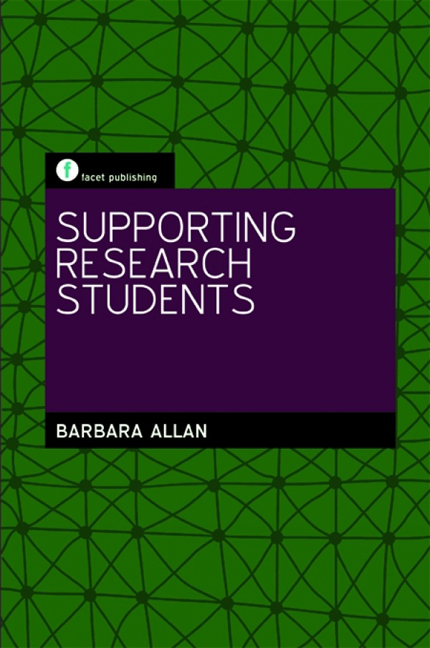Book contents
- Frontmatter
- Contents
- List of figures
- List of tables
- Acknowledgements
- 1 Introduction
- 2 Research and the research process
- 3 The research student's experience
- 4 Moving forward and completing the research
- 5 Research skills training
- 6 Supporting research students in academic libraries and information services
- 7 Virtual graduate schools
- 8 Introduction to research communities
- 9 Professional development
- Conclusion
- References and bibliography
- Index
4 - Moving forward and completing the research
Published online by Cambridge University Press: 09 June 2018
- Frontmatter
- Contents
- List of figures
- List of tables
- Acknowledgements
- 1 Introduction
- 2 Research and the research process
- 3 The research student's experience
- 4 Moving forward and completing the research
- 5 Research skills training
- 6 Supporting research students in academic libraries and information services
- 7 Virtual graduate schools
- 8 Introduction to research communities
- 9 Professional development
- Conclusion
- References and bibliography
- Index
Summary
Introduction
In this chapter I provide an overview of the research process, involving working on the thesis through to completing and obtaining a doctorate. This chapter covers topics such as: the literature review, methodology, fieldwork, writing up, the viva oral examination, amendments and completing the doctorate. As explained in Chapter 3, the final research proposal will have been developed, possibly throughout the first year of the doctoral programme for PhD students, and perhaps as a result of a taught module for students completing a professional or practice doctorate.
This chapter is illustrated with examples from my own doctoral research experience and from colleagues who have been willing to share their experiences with me.
Moving forward
Once the research student has developed her study by identifying the theoretical framework, identifying a focus and designing the research, then she is ready to progress her thesis. In the initial stages this is likely to involve further work on the literature review, more in-depth reading of the research methodology literature, and planning the field work or experiments. This period of the research process may take a year or even more, and it is likely that the student will revise the focus of her research, her methodology and her methods. Planning the fieldwork or experiments may also lead to further changes in the research process. For example, a student may find that she does not have access to a particular organization, or that her original plans were too ambitious to translate into a real-life experiment and that they need to be amended.
The literature review is a central part of a doctoral thesis, and Wellington et al. (2005, 73)suggest that it enables students to:
■ define what the field of study is, by identifying the theories, research, and ideas with which the study connects
■ establish what research has been done which relates to the research question or field of study
■ consider what theories, concepts and models have been used and applied in the field of study
■ identify and discuss methods and approaches that have been used by other researchers
■ identify the ‘gaps’ or further contribution that the present piece of research will make.
- Type
- Chapter
- Information
- Supporting Research Students , pp. 57 - 72Publisher: FacetPrint publication year: 2009



